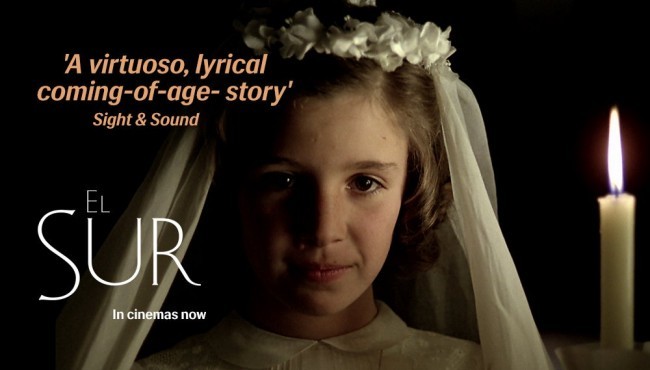
El Sur (1983) Blu-ray Review

Spanish director Victor Erice has only made two feature films, the rest of his career comprising of shorts and documentaries. His first film was the internationally acclaimed The Spirit of the Beehive (1973). Set in 1940, just a couple of years after the end of the Spanish Civil War, the film is seen through the eyes of a 7-year-old girl living in a small village who is traumatised after seeing the 1931 version of Frankenstein with Boris Karloff as the monster at the cinema. This leads her into a fantasy world of imagination and fear. 10 years later Erice’s second film is El Sur (The South) (1983) that once again shows us the world seen through the eyes of an 8-year-old girl.
The film is narrated by an older Estrella who recalls her childhood growing up in northern Spain in 1957. Estrella lives with her mother and father in a fairly large enclosed and isolated house among the local hills, just outside of a walled town. Estrella is close to her distant and often pensive father, Agustin who is something of an enigma to her. The manner in which Erice films the drama there is a clear love between the father and daughter relationship. Estrella spends time with her father as he uses a pendulum to divine for water, which to her seems magical. At home Agustin spends time alone in his attic room, lost in his thoughts. One day the family receives a fleeting visit from the South for Estrella’s confirmation. The visit is by two older ladies, Doña Rosario, Agustin’s aloof mother and Milagros (meaning miracle), the woman who mostly brought Agustin up. They have journeyed from the South, from Seville where Agustin grew up and for Estrella is a place of constant fascination which she dreams of visiting. Estrella grows close to Milagros and learns something of Agustin’s past, that he fell out with his father over politics; his father was a fascist supporter of Generalissimo Franco while Agostino clearly has socialist leanings and for his troubles spent some time in jail, setting up a permanent rift between father and son. Milagros explains that at one time her grandfather was with the ‘bad’ and her father was with ‘good’ but that soon changed. Estrella’s early understanding of politics. Estrella also learns at this point that her father may have had an affair with a Spanish film star and discovers a letter that seems to hint at this. In understanding her father Estrella is growing up and becoming more aware of the world.
Victor Erice’s film is slow but draws the viewer in. The camera is deliberately slow and builds some haunting images on the screen. Each frame seems to be composed like a painting creating a cultural resonance such as shafts of light that recall paintings by Vermeer or Caravaggio but rooted in a naturalistic setting. The magic consistently, both in El Sur and The Spirit of the Beehive revealing the world through a child’s eye like a haunting vision. Arguably only one other director may have captured this to the same degree and that is Andrei Tarkovsky with such films as Ivan’s Childhood (1962) and Mirror (1974). The lack of resolution and the films sensitivity to life, nature and love are unparalleled as the director projects the haunting memories of childhood.
At 95 minutes the film was intended by the director to be a lot longer. 3 hours in total. The film’s producer Elias Querejeta cancelled the shooting of the second part of the film when the story moves south, certain that the film was perfect the way it ends with Estrella travelling south. Once presented at Cannes it won many plaudits and a good choice for a BFI release. On Blu-ray the images look sharp and bring out the earthy colours of José Luis Alcaine’s cinematography. Extras on the disc are a 85 minute interview of Erice by Geoff Andrew and a beautiful video essay with clips called ‘Haunted Memory: The Cinema of Victor Erice’ by Adrian Martin and Cristina, Álvarez López. What the disc would have benefitted from would have been a couple of shorts by Erice to give a better overview of his small oeuvre.
Chris Hick
